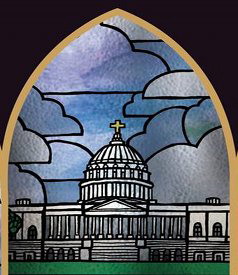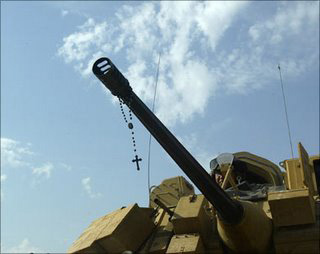|

by Yana Kunichoff
30 December 2010
from
TruthOut Website

The "Family" - Who
Really Is Behind This Secret Organization?
(Image: Hachette Book Group)
What if someone were to tell you that
your Congressman routinely bandies around phrases such as "Jesus
plus nothing," used to mean the complete rule of Jesus, and compares
the desired reach to that of Hitler or Ho Chi Minh?
If this makes you at all apprehensive,
then Jeff Sharlet's "C
Street - The Fundamentalist Threat to American Democracy"
is a must-read.
"Jesus plus nothing" is the mantra of the Fellowship, also
known as
the Family, a secret, fundamentalist Christian organization
peopled primarily by devout policy makers and high-ranking
individuals.
Though the nonbeliever's view of
religion can often be dismissive when faced with such catchphrases,
in "C Street," a nonfiction account of the extended reach of the
Family, these phrases fuel moral crusades with real, and terrifying,
impact.
Sharlet first introduced the world to the unseen hand of the
Fellowship in "The Family" in 2008, in which he reported on the
organization's beginnings in the 18th century, uncovered the role of
the Family in America's legislative system and uncovered the role of
religious fundamentalism in our supposedly secular nation.
In his latest book, Sharlet traces the powerful orthodoxy's chilling
influence on governments both inside and outside of the United
States as well as the devastating effects of fundamentalism within
the military.
He uses the Fellowship's Capitol Hill boarding house,
C Street, as a passageway to a broader discussion of the Family's
influences, which range from mediating the marital disputes of
Congressmen to increased military aid for countries whose prominent
politicians have connections (spiritual or otherwise) with the
Family.
"C Street" is thoroughly researched; in addition to his travels and
interviews, Sharlet says he spent weeks photocopying documents from
archives all over the country. In particular, he went through nearly
600 boxes of documents at the Billy Graham archives in Wheaton,
Illinois, where he stayed in a rented room furnished only with an
air mattress and a card table.
Sharlet begins his story at the C Street Center Inc., a nonprofit
offshoot of the Family in a red brick house on Capitol Hill to,
"assist [congressmen] in better
understandings of the teachings of Christ, and applying
it to their jobs."
Members of C Street, "the underground
network of Christ's men in Washington," include Sens.,
-
Don Nickles (R-Oklahoma)
-
Charles Grassley (R-Iowa)
-
Pete Domenici (R-New Mexico)
-
John Ensign (R-Nevada)
-
James Inhofe (R-Oklahoma)
-
Bill Nelson (D-Florida),
...as well as Reps.,
-
Jim DeMint (R-South Carolina)
-
Frank Wolf (R-Virginia.)
-
Joseph Pitts (R Pennsylvania)
-
Zach Wamp (R-Tennessee)
-
Bart Stupak (D-Michigan),
...and believe they have been appointed
by God.
Their actions in the name of the Lord include prayer meetings at the
Department of Defense and the Pentagon, and helping Governor
Sanford, Representative Pickering and Senator Ensign (whom Sharlet
describes as having "the most impressive tan in the Technicolor
portrait gallery of golf-happy, twenty-first-century political
America") cover up extramarital affairs and continue their political
careers.
In one case, the Family even pays off Ensign's former aide
- with whom he was having an affair while he was living at C Street.
This is a mild version of the Family's philosophy:
"the best way to help the weak is to
help the strong."
Yet, it is their na´ve, but powerful,
influence on religious rhetoric used in conflicts and legislature
abroad that leads one from simply raised eyebrows to widened eyes.
According to Sharlet, the Family had,
"cells in the governments of seventy
nations by the late 1960s, more than double that of just a few
years earlier."
These cells operated, as many of the
Family's projects do, through God,
"the Catholic generals and colonels
who rotated coup by coup through the leadership of Brazil,
Guatemala, El Salvador... consented to the Protestant
ministrations of the Fellowship in return for access to American
congressman."
More recently, after meetings between
members of Sri Lanka's own prayer breakfast and Congressional
representatives of the Family, the small, Southeast Asian country
received more than $50 million in military aid between 2004-2007.
In the previous three years, from 2000
to 2003, it only received a fifth of that amount, and in 2008, Sri
Lanka was accused of "intentionally and repeatedly" wantonly
shelling civilians, hospitals and humanitarian operations with
weapons that, it is likely, came from American military aid.
Most vivid is Sharlet's focus on the Fellowship's activities in
Uganda, where, in 2009, a bill was introduced into the Ugandan
Parliament that would condemn to death individuals convicted of,
"aggravated homosexuality," which
includes "simply sex, more than once," and three years in prison
"for failure to report a homosexual within twenty-four hours of
learning of his or her crime."
Sharlet draws links between the Family
and evangelical church leaders and politicians championing the bill
in Uganda (including David Bahati, who introduced the legislation
into Parliament); the Family has donated millions of dollars to
Uganda for "leadership development" - more, writes Sharlet, than it
has invested in any other foreign country.
Though he draws the line at saying that the virulently anti-gay bill
in Uganda means that the Family supports the death penalty for gay
people, he notes that that,
"the real question is instead one of
ideological transmission, the transfer of ideas... the Family
didn't pull the trigger; they provided the gun."
Sharlet travels to the East African
country to meet politicians, who blithely call the closet "a strong
African tradition," and speak confidently of their "American
friends," various American evangelicals, including some from the
family, but also speaks to a young, gay man on the run, illustrating
with affecting anecdotes the human lives ruined by such a tide of
"morality."
Near the end of the book, Sharlet brings the story back home again:
to the role of the Family in the military.
He tells the story of a US unit in Iraq
which heads into combat with "Jesus Killed Muhammed" painted
in both English and Arabic on one of their tanks, as well as Muslim
and Jewish soldiers who crack under the constant religious taunting.


jesus
killed mohammed
The book itself reads like a hyper-real nightmare; the detailed
glimpses of emotionally stifled Congressional love affairs come with
the added intimacy of love letter excerpts, and Sharlet's
conversations with evangelical politicians in Uganda are especially
well-fleshed.
For example, during one conversation
with an evangelical politician, Sharlet became keenly aware that he
could also be prosecuted under Uganda's homophobic legislation - for
promoting homosexuality by not turning in any gay people he may
know.
The extent of the connections between the Family and chastised
senators, the Sri Lankan government's decision to drop bombs on
civilians, a virulently homophobic bill in Uganda or extreme
religious pressure applied to soldiers in combat zones are at times
somewhat murky, but this is itself a symptom of how the Fellowship
functions,
"the more invisible you can make
your organization," Doug Coe, associate director of the
Fellowship, says in "C Street," "the more influence it will
have."
The Family divides its finances,
"between several smaller offshoots,
some off-the-books accounting... and the Fellowship Foundation."
In addition, Sharlet notes, it shifts
around its properties and supporting organizations - for example,
the Downing Foundation in Englewood, Colorado, describes its mission
as supporting the Family's Fellowship Foundation,
"to which it sends an average of
$88,000 a year."
Sharlet highlights numerous front
organizations, though there are other sources of funding for the
Family's expenses that are even less kosher - for example, Sen. Tom
Coburn charged American taxpayers $11,000 for a trip to Lebanon to,
Coburn says, build prayer groups - in one of the most religiously
contested areas in the world.
Though a review in The Washington Post calls Sharlet's thesis of an
America without contraception or public schools "almost unhinged,"
the recent rise of the Tea Party since "C Street's" publication and
legislation such as unemployment benefits held hostage to tax cuts
for the wealthiest American cast doubt on whether we can dismiss the
threat posed by the actions of the Family to positions such as gay
rights, religious freedom or the separation between church and
state.
This brings us to one of Sharlet's central points in the book: how
do we hold lawmakers accountable who believe they have a divine
right to rule?
Mikey Weinstein, a former Air Force commander and founder and
president of the Military Religious Freedom Foundation, who deals
with calls daily from soldiers with testimony of religious
harassment, says the only way to combat the influence of the,
"multi-dimensional, theocratic,
dominating, democracy-destroying monster" that is the Family is
to court-martial them all.
Sharlet, however, is more circumspect.
"I'm doing it the best way I know
how ... it's also the only honest way. You compete with them in
terms of free speech," he said. "You keep the pressure on, you
keep people asking questions and you make it in the Family's
best interest to become transparent."
|



